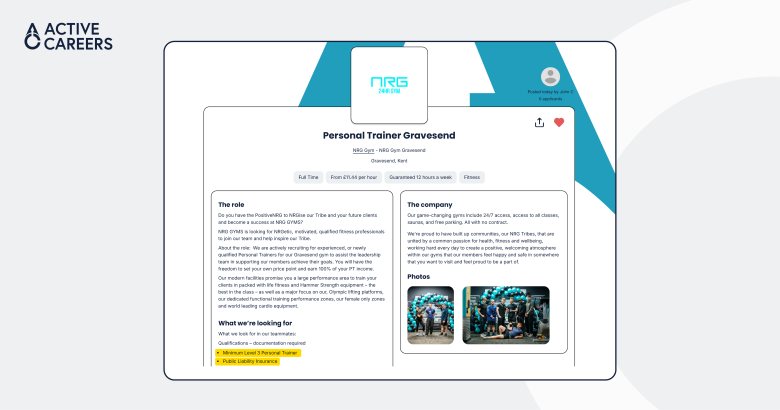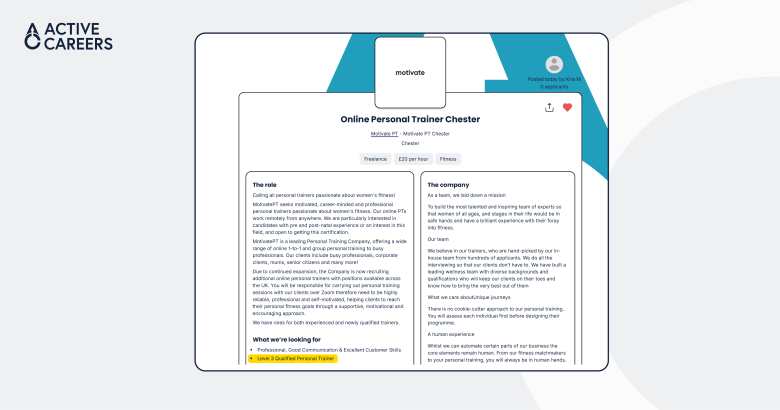
Can You Become a Personal Trainer without certification (UK)
is it illegal to be a personal trainer without certification: Lawyers Opinion
In this article we will cover if you can become a personal trainer without certification and to provide clarity, we have asked two UK based law firms to help answer the question.
We'll review if it is a legal requirement, what the implications could be, if this changes if you have a sports related degree and if this matters if you want to train client online.
Is it Illegal to be a Personal Trainer Without Certification?
Firstly the title “Personal Trainer” or any of the equivalent terms like “online fitness coach” or “Fitness Trainer” are not legally protected terms and thus anyone can call themselves a Personal Trainer regardless of their background or qualifications that they hold.
A legally protected title is a job title that is actually illegal to harness such as a dietician or a physiotherapist where you can be criminally prosecuted for using it.
This is to protect the general public from being potentially misled. The HCPC states this "could lead to a criminal record and a substantial fine of up to £5,000".
Why you Shouldn’t be a Personal Trainer Without Qualifications or Insurance
There are four main reasons why you shouldn’t be a personal trainer without being certified:
No Employer Will Hire You
If you’re planning to work in a gym, studio, leisure centre or anywhere really, you’re not going to even be interviewed for a personal training job, let alone hired.
Fitness facilities have employment criteria policies and will be looking for individuals that have both the appropriate qualifications, accreditation and insurance.
See below the personal training job post by NRG Gyms in Gravesend on our jobs board where they have stipulated that they require all applicants to have at minimum a Level 3 in Personal Training and public liability insurance:

Or here where online PT Company, Motivate PT have posted a PT Job looking for an online trainer also require you to have the Level 3 in Personal Training:

Can you Get Personal Trainer Insurance without Certification?

Typically the first thing you do when you complete your personal training qualifications is obtain insurance such as professional indemnity and public liability insurance.
If you think you can get personal training insurance without certification you’re sadly mistaken.
Insurance companies perform background checks and you also will be required to submit your qualifications, which you won’t have.
Ramzy Ladah, a trial attorney and personal injury lawyer at Ladah Law Firm said:
“You can call yourself a personal trainer, but if you don’t have insurance, you could face legal trouble if someone gets hurt. If a client files a claim and you have no certification or insurance, you’ll be on the hook financially, and you could lose everything if there’s a serious injury. Even if your workout plan was fine, you’d still need to defend yourself without any protection”
You Do Not Have the Knowledge

You might think you know a lot about training, but the reality is most people that are not qualified, have minimal knowledge on training or know small amounts solely about the form of training they undertake themselves.
For example, you might be someone who loves weight training and goes to the gym to put on muscle and you even help out fellow gym goers within the weights area.
But, can you help clients with their goals or needs that differ from your own?
Can you adapt programmes for different training aims, catering for injuries or particular medical conditions like fibromyalgia? Do you know all of your advanced training systems and how to implement them? Can you provide a nutrition plan for someone who is anaemic, diabetic and follows a kosher diet?
These aspects are covered within a personal training qualification and truthfully you are going to massively struggle without the proper qualification behind you as to put it simply, you don’t have the knowledge to do the job.
Clients will pick Somebody Who Is Qualified

You will really struggle to build a client base as you're going to face two major hurdles.
If you don’t tell clients upfront that you’re not qualified and they find out later, that could cause clients to leave you and on mass as clients talk. This in turn can damage your reputation and future credibility with other prospective clients.
Raja Yousaf, who is the Head of Gym Accident Claims at Graham Coffey & Co. Solicitors said:
“Holding certification and insurance can provide reassurance to prospective clients when selecting a personal trainer”
The alternative is to tell clients upfront that you are personal training without a license or proper accreditation behind you.
This might give you some goodwill, however the reality is that they will simply pick a trainer that actually is qualified, especially when you’re charging a lot of money for your services.
Who would you rather pick to do the plumbing on your house, the one who has no formal qualifications or the guy that has all their certification and insurance in place?....I know which one I would pick!
What if I use Fake Personal Training Certificates or I lie About my Credentials?

If you have used fake certificates to gain insurance or lied directly to a client about the credentials or licenses you hold, either via digital media, in-person or any other format, you may find that you're not just in a liable predicament, but a criminal one.
This is echoed by personal injury lawyer Ramzy who said:
“It is illegal, however, to lie about having qualifications or licenses you don’t actually hold. If you pretend to be certified when you’re not, you could face fraud charges. This might lead to fines, a criminal record, or even jail”.
This is mirrored by Head of Gym Accident Claims Raja Yousaf:
"Pretending to hold qualifications you don’t have may be considered misleading, especially when doing so to gain financial benefit. Penalties could involve fines and imprisonment in more serious cases"
See below how the Daily Mail has reported on an individual called Phillip Spain who was sentenced to two years in prison for fraud and had to pay a heavy fine for using fake certificates:

What if I get my Clients to Sign a waiver or Disclaimer?

Waivers and disclaimer forms are utilised by qualified personal trainers to try and remove liability from themselves if anything untoward happens to their client under their care.
Waiver forms that include terms that pertain to excluding liability for injury or death are not actually legally enforceable when resulting from gross negligence or being reckless.
A lawyer would argue that being a personal trainer without insurance and certification would be negligent to your duty of care and professional position.
John Beck, an attorney, auto accident law expert, and Founding Partner at Beck & Beck Missouri Car Accident Lawyers said:
"Getting a client to sign a waiver saying they know the trainer isn't qualified might give some protection, but it doesn't fully shield the trainer from legal responsibility—especially if they’re negligent. Waivers are meant to let clients know about the risks involved, but they don’t cover situations where the trainer is reckless or grossly negligent (which can happen if they don't hold the full knowledge of a normal, qualified professional). If a trainer makes a significant mistake leading to injuries or death, like failing to take proper precautions or ignoring clear signs of a client's health risk, a waiver won’t save them. In the UK, courts look closely at waivers, especially in such serious cases, so even with a signed form, the trainer could still be held liable for their actions."
If you personal train a client without certification and a claim was brought against you for an injury they sustained whilst following your instructions, an injury lawyer specialist would strongly argue that you do not have the knowledge, expertise, qualifications, license or ability to personal train their client and that you have breached their duty of care, thus potentially making you liable for damages.
If you have falsified documents such as your certificates or made false representation of your qualifications and a client dies e.g. from a cardiac arrest whilst training with you, the CPS could charge you with involuntary manslaughter, which comes with long jail time.
See below what Benson Varghese said, who is a Board Certified Criminal Lawyer and a criminal defense attorney, as well as the founder and Managing Partner of Varghese Summersett:
"If a client dies during a session with an unqualified and uninsured trainer, the consequences could be very serious. The trainer could be sued for negligence or wrongful death, and in some cases, they might even face criminal charges. If the trainer ignored clear warning signs or didn’t know how to handle an emergency, they could be held responsible. While “corporate manslaughter” usually applies to businesses, an individual who acts recklessly could face charges like involuntary manslaughter, depending on the laws in that area. Not having proper training or insurance would make the situation worse because there wouldn’t be any professional support to help with legal or financial costs"
Can you Be An Online Personal Trainer Without Certification?

If you’re based in the UK, all of the above still applies to you.
Even if you have international based clients that you have acquired from social media, you are a UK resident and thus are bound by the same laws and regulations as a face to face trainer in a your local gym or studio.
You still won’t be able to get insurance and you still will be open to litigation and a civil action lawsuits being brought against you, even if you administered a programme that is well constructed.
I have a degree in a Sports Related Field, Can I personal Train Clients?

Just because you have undertaken a degree within a sports related field does not mean that you will get insured as a personal trainer or that you will not be liable for any injuries that a client sustains.
I myself have a masters degree within sports science, but ascertained my Personal Training qualifications as I knew I wouldn’t be able to get a job or get insured to be able to run PT sessions without the right qualification.
Certain parts of your degree can be used as RPL (recognition of prior learning) depending on the degree and modules within that degree you have completed.
Having a degree within a sports related field will help you complete the course in a fast time period as there is large amounts of crossover with modules such as anatomy and physiology and principles of exercise and health.
This being said, there will also be modules that the majority of degrees do not cover such as the application of nutrition and client programming.
What are the Official Qualifications Needed to Be a Personal Trainer?
Personal Training qualifications in the UK are regulated by Ofqual.
Ofqual regulates qualifications across a wide spectrum of qualifications including web design, hairdressing, beauty, electricians, plumbing, social care.....I could go on.
Ofqual is the vocational equivalent to Ofsted and provides qualification frameworks and ensure course content has minimum standards across multiple sectors. They regulate governing bodies, universities, colleges and training providers under their umbrella.
In order to qualify as a Personal Trainer in the UK, there are two qualifications you need to achieve.
An Ofqual regulated Level 2 in Fitness Instructing and Level 3 Personal Training qualification.
You must complete the Level 2 in Fitness Instructing before you can move onto the Level 3 in Personal Training but most training providers package these qualifications together to form a PT Diploma so you can complete them as one course.
Most major employers will also look for an extra piece of accreditation, CIMSPA accreditation.
CIMSPA stands for the Chartered Institute for the Management of Sport and Physical Activity and they help drive the standard of Personal Trainers entering the industry and the quality of training delivered by educational institutions.
See here the freelance personal training job by Fitness First who are are only looking for applicants that have CIMSPA endorsement:

How to Pick a Regulated Training Provider
If you want to check that a training provider is CIMSPA approved, you can check the CIMSPA endorsed training directory by searching for the provider in question.

Another thing to look out for is what CIMSPA status the provider has. This is only important to you picking a provider that is of high quality.
CIMSPA grades providers against extensive criteria with 3 stars being the best and what they call "enhancing status" and 1 star being the worst to what they call "Emerging status":

This helps people like you, know the quality of the training you are buying.
Training providers with 3 star and enhancing status will proudly display this on their website, as training provider OriGym have done here:

Download OriGym's Prospectus
Active Careers has partnered with OriGym, UK Training Provider of the Year at the British Fitness Awards. OriGym are Ofqual regulated, CIMSPA Partner and have CIMSPA 3 star rating. You can download their personal training course prospectus below
Conclusion
If you want to offer personal training without a license or a certificate then you do so at your own risk.
Just bear in mind the potential legal consequences and what you want for your career in the future.

